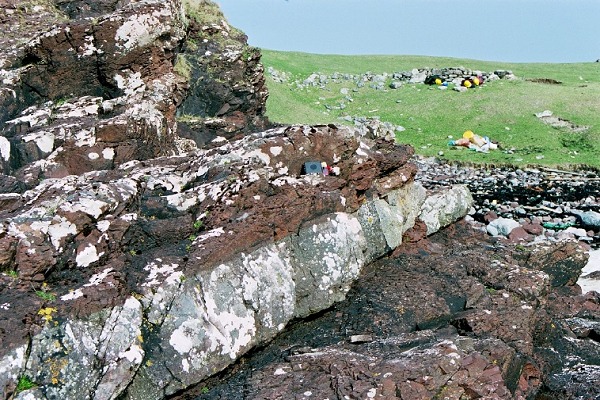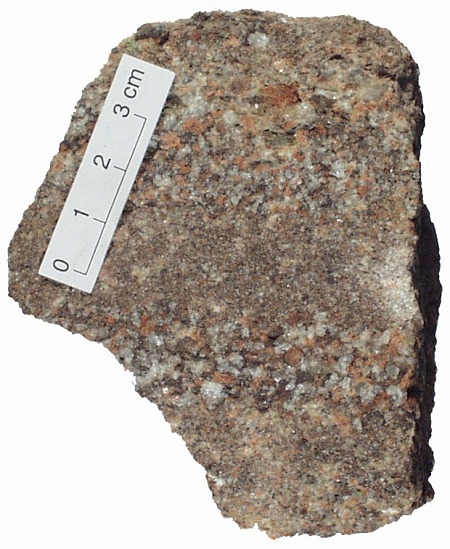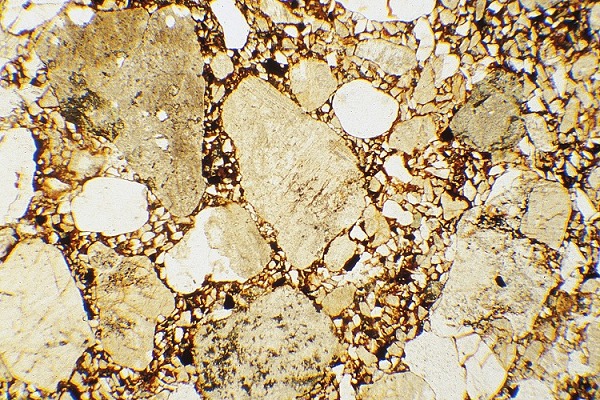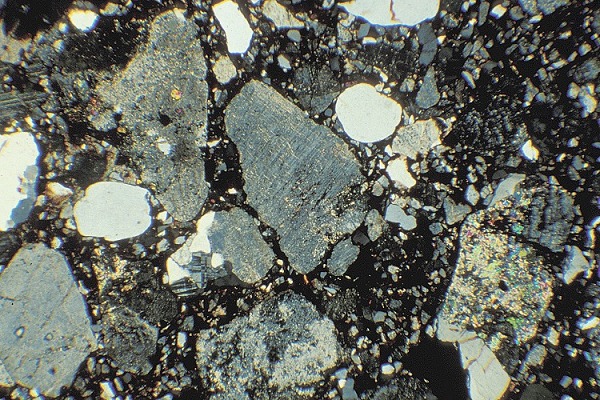
| Home | Geological History | Stratigraphy | Area map | Rock Index | About |
| Scourie | Achmelvich | Laxford | Clachtoll | Stoer | Assynt | Skiag Bridge | Glencoul | Knockan | Borralan | Ledmore |
These sandstones lie just above the Lewisian Gneiss basement at Clachtoll, NW of Lochinver.

![]() Interbedded coarse and medium-grained sandstones, Stoer
Group (Torridonian), Clachtoll
Interbedded coarse and medium-grained sandstones, Stoer
Group (Torridonian), Clachtoll
Brown sandstones were laid down by rivers flowing in the
valleys cut in the Lewisian Gneiss surface. Some are softer
and darker-coloured, some are paler and better cemented.
They lie on top of, and also grade sideways into, the
comglomerates that lie on the gneiss surface itself. The
gneiss, with its thin covering of conglomerate, is just out
of the picture to the right. The white patches on the
outcrop are lichens. The compass-clinometer is about 10 cm
long.

![]() Coarse-grained sandstone, Stoer Group (Torridonian),
Clachtoll
Coarse-grained sandstone, Stoer Group (Torridonian),
Clachtoll
Individual sand grains are up to 4 mm across. The bedding
is shown by changes in grain size from layer to layer.
Glassy white grains are quartz; pinkish-orange grains are
feldspar. Strictly, this is an arkose, a
feldspar-rich sandstone. The matrix has the purplish-brown
colour characteristic of the Torridonian rocks.

![]() Coarse-grained sandstone, Stoer Group
(Torridonian), Clachtoll
Coarse-grained sandstone, Stoer Group
(Torridonian), Clachtoll
Poorly sorted angular grains are cemented by a dark
orange-brown matrix. Clear grains are quartz; cloudy grains
are feldspar. Note the great range in particle sizes, the
angularity, and the large amount of feldspar. These all
imply that the material has not spent a great deal of time
being subjected to weathering and transport processes at
the Earth's surface.
Plane polarized light, field of view 7 mm across.

![]() Coarse-grained sandstone, Stoer Group
(Torridonian), Clachtoll
Coarse-grained sandstone, Stoer Group
(Torridonian), Clachtoll
This view under crossed polars makes it clear that most of
the larger clasts are actually fragments of Lewisian Gneiss
rather than individual grains of quartz or feldspar. Each
clast contains a number of crystals of feldspar and quartz,
and they closely resemble the textures of the underlying
gneisses. The dusty, bright-coloured material in the
feldspar grains is very fine mica crystals, the beginnings
of chemical breakdown of the feldspar while it was still
part of the gneiss.
Crossed polars, field of view 7 mm across.
| Scourie | Achmelvich | Laxford | Clachtoll | Stoer | Assynt | Skiag Bridge | Glencoul | Knockan | Borralan | Ledmore |
| Home | Geological History | Stratigraphy | Area map | Rock Index | About |
D.J. Waters, Department of Earth Sciences, May 2003